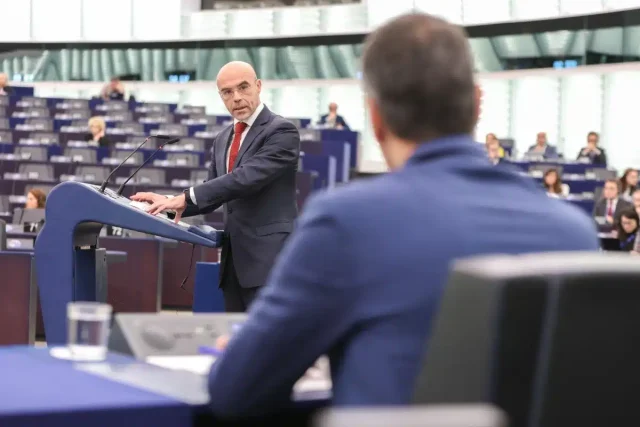
On 13 December, Spanish Prime Minister Pedro Sánchez addressed the plenary session of the European Parliament in Strasbourg on the occasion of the closing of the Spanish Presidency of the European Council, which began in July and ends this December.
During the plenary session, the head of the VOX (ECR) delegation in the European Parliament, Jorge Buxadé, accused Spanish Prime Minister Pedro Sánchez of having “distributed European funds among public bodies to weave his own web of personal favours”.
This accusation came a few days after the government of Pedro Sánchez finally sent the list of the 100 largest beneficiaries of European funds to the European Commission, several weeks late and after several warnings from the Commission. A list that shows that almost 60% of the major recipients of Next Generation funds belong to the public sector and that Adif – the public railway entity under the Ministry of Transport – is the entity that has received the most funding, with almost half of the funds awarded to the top 100, exceeding 2,500 million. It is followed by the Ministry of Transport itself with 307 million, and the third is the state cybersecurity institute Incibe with 171 million. The truth is that we must go to the eighth place in the table to find the first private company. Reviewing the list, we can see that only 39% of these 100 major beneficiaries of the so-called Recovery and Transformation Plan for Spain are private companies. Among the 100, 5.1 billion have already been awarded, 14% of the funds received so far by Spain.
The distribution is part of the Sánchez government’s strategy to fatten and dominate the Spanish public sector, with the aim of winning the loyalty of public employees and having control of all state bodies. In this sense, we have already seen in recent years how the number of public employees has multiplied – it has grown by more than 400,000 workers since 2018 and now exceeds the 3.5 million mark – and how President Sánchez has placed friends and relatives in management positions in public companies such as Correos –the Letter post public company–, the Sociedad Estatal de Participaciones Industriales (SEPI), the Centro de Investigaciones Sociológicas (CIS) –the public organisation responsible for carrying out political and social surveys–, or the state attorney general’s office, among many others.
This controversy over the lack of control over the use of European funds in Spain has occurred at the same time as the European Parliament’s Committee on Budgetary Control published its annual anti-fraud report for 2022. A document in which “the EU’s efforts to combat fraud and the measures needed to better protect and control EU funds” are collected and evaluated. In this document the European supervisory body has not hesitated to highlight the great risk “to the financial interests of the EU due to nepotism in the procurement of EU funds”.
The approved text points to two dubious financial items: “EU funds for assistance in non-EU countries and money allocated to deal with Europe’s response to Russia’s aggression against Ukraine. Both are “not adequately supervised and controlled”. The text finally calls on the European Commission to “carry out more thorough checks to ensure that EU funds end up going to those most in need”.
It should also be noted that a delegation from the Budget Committee made a three-day visit to Spain in February this year to examine the transparency and efficiency of the government’s management of the Next Generation EU funds in Spain. At a press conference following the visit, the head of the delegation, German MEP Monika Hohlmeier, said that the transparency with which Spain is implementing the funds “could be improved”. In addition to improving transparency, Hohlmeier said that Spain already needed to cut red tape and pay more attention to co-governance with the autonomous communities.



 Subscribe
Subscribe